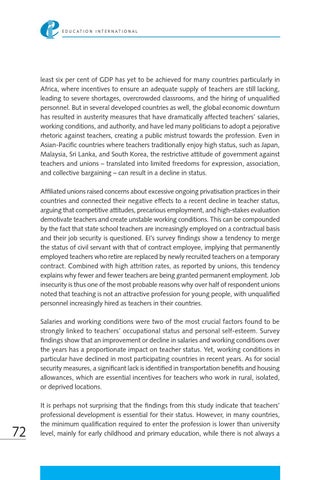E D U C AT I O N I N T E R N AT I O N A L
least six per cent of GDP has yet to be achieved for many countries particularly in Africa, where incentives to ensure an adequate supply of teachers are still lacking, leading to severe shortages, overcrowded classrooms, and the hiring of unqualified personnel. But in several developed countries as well, the global economic downturn has resulted in austerity measures that have dramatically affected teachers’ salaries, working conditions, and authority, and have led many politicians to adopt a pejorative rhetoric against teachers, creating a public mistrust towards the profession. Even in Asian-Pacific countries where teachers traditionally enjoy high status, such as Japan, Malaysia, Sri Lanka, and South Korea, the restrictive attitude of government against teachers and unions – translated into limited freedoms for expression, association, and collective bargaining – can result in a decline in status. Affiliated unions raised concerns about excessive ongoing privatisation practices in their countries and connected their negative effects to a recent decline in teacher status, arguing that competitive attitudes, precarious employment, and high-stakes evaluation demotivate teachers and create unstable working conditions. This can be compounded by the fact that state school teachers are increasingly employed on a contractual basis and their job security is questioned. EI’s survey findings show a tendency to merge the status of civil servant with that of contract employee, implying that permanently employed teachers who retire are replaced by newly recruited teachers on a temporary contract. Combined with high attrition rates, as reported by unions, this tendency explains why fewer and fewer teachers are being granted permanent employment. Job insecurity is thus one of the most probable reasons why over half of respondent unions noted that teaching is not an attractive profession for young people, with unqualified personnel increasingly hired as teachers in their countries. Salaries and working conditions were two of the most crucial factors found to be strongly linked to teachers’ occupational status and personal self-esteem. Survey findings show that an improvement or decline in salaries and working conditions over the years has a proportionate impact on teacher status. Yet, working conditions in particular have declined in most participating countries in recent years. As for social security measures, a significant lack is identified in transportation benefits and housing allowances, which are essential incentives for teachers who work in rural, isolated, or deprived locations.
72
It is perhaps not surprising that the findings from this study indicate that teachers’ professional development is essential for their status. However, in many countries, the minimum qualification required to enter the profession is lower than university level, mainly for early childhood and primary education, while there is not always a
